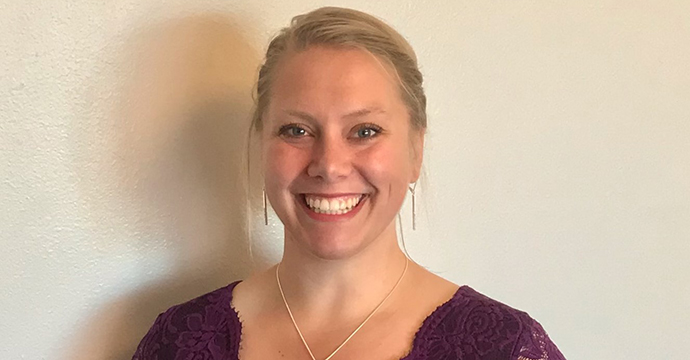Inspiring the Next Generation in STEM: The Transformative Impact of COWGIRLS in STEM
Ashleigh Pilkerton studied Bioinformatics and Biology at Pacific University in Oregon. As the only woman from her background in the bioinformatics field program, she was inspired to make a difference.
"I felt really isolated, and never felt like I fit in," Pilkerton recalls. "But everything changed when I met one of the computer science professors who was passionate about expanding access to STEM. I had the opportunity to work with her on a National Science Foundation-funded computer science camp. That’s where the idea for COWGIRLS in STEM was born."
Pilkerton joined the Wyoming Cooperative Fish and Wildlife Research Unit as a PhD graduate student in the Department of Zoology and Physiology. Inspired by the camp's ability to spark interest in STEM, Pilkerton knew she had to bring a similar program to her new home in Wyoming. After winning the Stewart Family Serviceship Award in 2021, Pilkerton created COWGIRLS in STEM. The program sets out to empower young girls in Wyoming to pursue careers in science, technology, engineering, and math (STEM), particularly computer science.
Studies show that girls lose interest in STEM subjects at around 15 years old, and the perception that boys are more interested than girls in STEM subjects starts at around age six. To combat this, Pilkerton’s vision was to create a supportive, inclusive environment where girls of all backgrounds could explore their passions and see themselves as future leaders in STEM.

Ashleigh Pilkerton
"COWGIRLS in STEM has a well-thought-out structure with near-peer mentors who serve as the ‘camp counselors’ for the students," Pilkerton explains. "I’m there every day to provide support, so the program truly has this multi-level approach, where the participants learn from their mentors, and the mentors learn from me."
COWGIRLS in STEM fosters a welcoming, supportive atmosphere from day one. Through icebreakers, team-building activities and clear expectations, the program ensures that every participant feels valued and empowered to take risks and explore new ideas.
"When working with any group of students, it’s vital to consider how we can be more inclusive," Pilkerton emphasizes. "We focus on using active learning techniques to fully engage youth with the content."
The curriculum itself is designed to be engaging and diverse, featuring unplugged computer science lessons, hands-on programming activities and exciting STEM field trips. Whether it’s building bottle rockets, studying local aquatic ecosystems or coding interactive games, participants are immersed in a world of discovery and innovation. At the heart of COWGIRLS in STEM are these near peer mentors; undergraduate and high school students who serve as camp counselors and lesson leaders. These relatable role models are essential in helping the participants envision their own paths to success.
"Having someone close to their age, who speaks their language, shows them that they can succeed too," Pilkerton describes. "The mentors show them that everyone can thrive in STEM, and that's something I want for these students."
The impact of COWGIRLS in STEM extends beyond the one-week summer camp. Pilkerton’s research has shown that the program’s near-peer mentorship model has a profound effect on the undergraduate and high school students themselves. Near-peer mentors are reported to have increased confidence and personal growth, clarified career goals and formed lasting professional and personal connections.
“Being a near-peer mentor inspired me to work even harder to achieve my career goals to show other girls they too can be successful in STEM,” said one of Pilkerton’s near-peer mentors.
As COWGIRLS in STEM continues to grow, Pilkerton’s vision of a more diverse, equitable STEM workforce is slowly but surely becoming a reality. One camper at a time, the program is inspiring the next generation to dream big, embrace their passions and break barriers in STEM.
The serviceship award is funded by the Stewart Family in honor of their late parents, Clyde and Jerrine Stewart, of Sheridan, who served as daily examples of “people immersed in family, community and work.” The couple helped to address community needs and real-world challenges. The award continues their legacy by supporting students working on their own applied community service projects that address needs and challenges on a local, state, national or global level.

